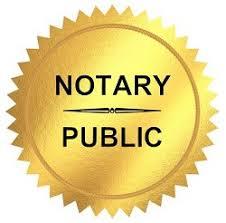Deceased Estate Management: Taking Care Of Properties and Affairs After Passing
Debunking Notarial Job: Simplifying the Duty and Value of Notaries
In the complex web of legal documentation and verification, notaries stand as pillars of guarantee and authenticity. Their function, often shrouded in enigma for many, carries significant weight in making certain the legitimacy and honesty of crucial files. As guardians of legitimacy and reality, notaries play an essential component in our culture, yet their job is not constantly fully understood. By unwinding the complexities shedding and surrounding notarial techniques light on the importance of their acts, a clearer understanding arises of the essential function notaries play in maintaining the material of legal and contractual agreements.
The History of Notarial Work
The background of notarial job days back to old civilizations, where scribes played a vital role in videotaping crucial information and confirming files. This led to the advancement of notaries, people appointed by the state to act as neutral witnesses in lawful matters.
During the Middle Ages, notaries obtained prominence in Europe, with their functions expanding to include preparing lawful documents, certifying signatures, and protecting documents. The surge of international trade even more highlighted the value of notarial job in verifying agreements and arrangements throughout boundaries.
In the contemporary age, notaries remain to play an essential duty in lawful and organization transactions by verifying identities, confirming the authenticity of documents, and preventing fraud. Their duty in accrediting the legitimacy of contracts includes a layer of safety and trust fund to the ever-evolving landscape of commerce and law.

Tasks and Obligations of Notaries
The historical development of notarial work from ancient civilizations to the modern-day age has formed the distinctive responsibilities and responsibilities that notaries promote in legal and business purchases today. Notaries play an essential function in verifying the credibility of files and the identification of notaries. One of their key obligations is to witness the finalizing of crucial documents, such as acts, wills, and contracts, to make certain that all celebrations are getting in into arrangements knowingly and voluntarily. Notaries also verify that signatories are of sound mind and not under discomfort or coercion.
In addition, notaries are tasked with providing affirmations and vows, which are important in lawful process and the implementation of affidavits. They accredit duplicates of original papers, giving assurance to institutions that the copies are real reproductions of the originals. Notaries need to keep exact documents of all purchases they oversee to guarantee transparency and responsibility. In general, the tasks and duties of notaries are essential in safeguarding the integrity and legitimacy of numerous records and transactions.
Notarial Certificates and Signatures
Exemplifying thorough focus to detail, notarial certificates and signatures work as necessary elements in confirming the authenticity of legal records. Notarial certificates normally have important details such as the day of notarization, the names of the signatories, a summary of the record, and the notary's main seal. find out this here These certifications provide a clear record of the notarial act, guaranteeing that the document can be quickly identified and traced back to the notary that managed the process.
Signatures play an essential role in notarial work, as they represent the agreement and consent of the celebrations included. Notaries meticulously witness the signing of papers to confirm the identification of the signatories and confirm that they are signing of their very own cost-free will. By affixing their official seal Going Here and signature to the document, notaries certify that the needed treatments have been followed which the paper is valid and enforceable.
Basically, notarial certificates and signatures are the hallmark of credibility in legal transactions, providing guarantee to all events involved that the files are legit and binding.
Importance of Notarial Acts

Registration Refine Discussed
The notarization process normally begins with the private presenting the document to a notary public. As soon as the identification is validated, the notary makes certain that the individual signing the file does so willingly and without any type of threat.

Conclusion
:max_bytes(150000):strip_icc()/GettyImages-598314157-cb6389c9e28f4c1aaf002263febab019.jpg)
Notarial certificates normally contain important details such as the day of notarization, the names of the signatories, a description of the record, and the notary's official seal. These certificates supply a clear document of the notarial act, making certain that the document can be easily identified and traced back to the notary who managed the procedure.
By fastening their main seal and trademark to the record, notaries license that the necessary treatments have been complied with and that the file is valid and enforceable.
By confirming the identity of the signatories, confirming their determination to enter into the agreement, and certifying the day and area of the finalizing, notaries play an essential role in upholding the validity of legal files.After the file is signed, the notary will certainly fasten their main seal or stamp onto the file.